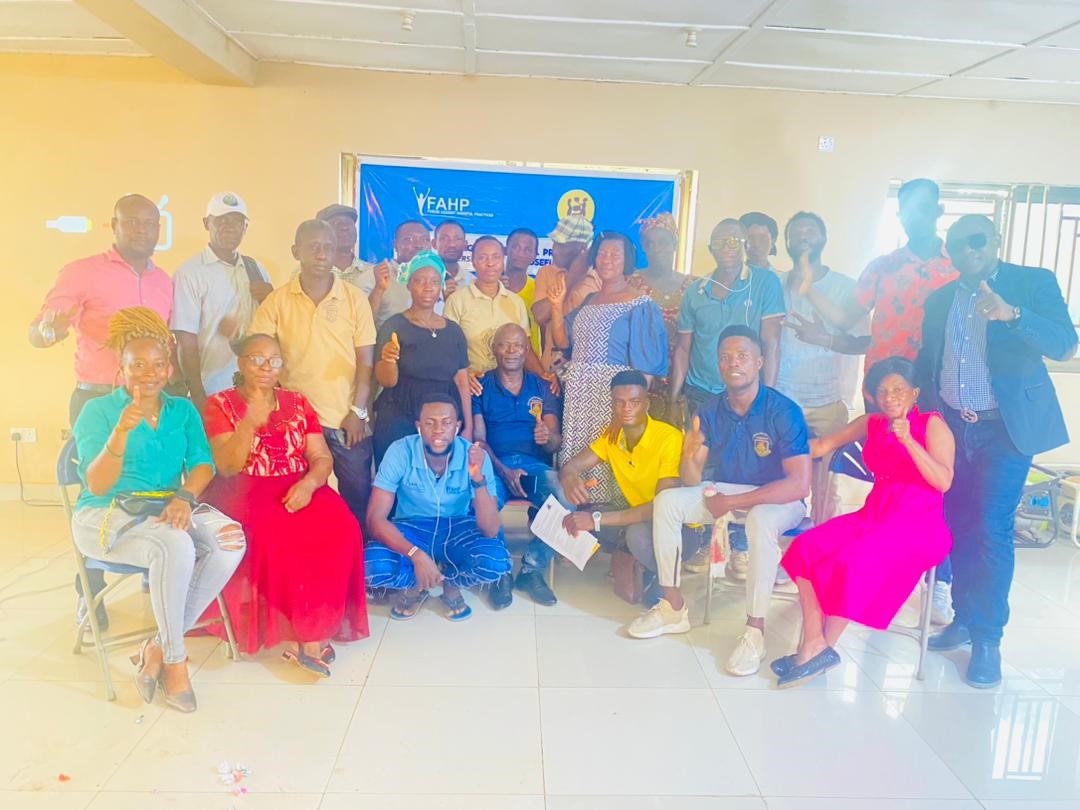The Forum Against Harmful Practices (FAHP) has ended a two day Training of Trainers (TOT) for frontline professionals including focal teachers/community outreach officers on the integrated gender and FGM training manual produced by a leading consultant Rev. Moses Frederick Khanu funded by Irish Aid.
The two day engagement which was held at the Prince Tuner Hall, Black Hall Road Igbo Town, Waterloo in the Western Rural was very engaging and impactful.
The participants who attended came from implementing partners Purposeful Projects (WAADO-Waterloo and ACT-Pujehun).
The development of the training manual was funded by the Irish Aid through the project titled: “Strengthening FAHP for the coordination of FGM reduction in Sierra Leone, influencing Zero Tolerance.”
The manual which was designed to enable and support the work of field facilitators delivering the training to Female Genital Mutilation (FGM) work groups. The Manuel provides a provide comprehensive, standardized content and skills needed to promote the abandonment of the practice of female genital mutilations (FGM).
The TOT aimed to equip participants with the broader understanding of the socio-cultural context of the practice, knowledge and awareness, skills, and resources necessary to becoming effective trainers and advocates in the campaign to end FGM by providing an enabling environment for a new world where Sierra Leonean women and girls are living in free from the abuse and violence of FGM whilst enabling them to live in safety, dignity and freedom.
The TOT will also serve as a platform for capacity building, fostering collaboration and empowering participants to lead community-based initiatives and awareness campaign.
This manual was developed within the framework of the project “Strengthening the Forum Against Harmful Practices (FAHP) for the coordination of Female Genital Munlation/ Cutting in Sierra Leone Influencing Zero Tolerance” financed by Irish Aid Sierra Leone.
The manual which has been used by FAHP is a comprehensive tool that field facilitators across the wider stakeholders (Government and Non-Governmental Organizations) can use to approach the discourse around Female Genital Mutilation/ Cutting from a gender perspective in order to increase participants understanding of FGM/C as a harmful practice and a form of violence against women and girls.
The manual is well researched and rich in content, providing facts, root causes and socio-cultural dimensions of the practice and knowledge about the most innovative and successful interventions in reaching the necessary critical mass on the abandonment of FGM/C.
Delivering presentation, the Executive Secretary of FAHP, Madam Aminata Koroma said “that Female Genital Mutilation/ Cutting (FGM/C) is a deeply rooted cultural practice that has persisted for centuries, affecting the lives of millions of women and girls worldwide.”
Ms Koroma went on to say that “FGM/C poses a grave threat to the physical, psychological, and reproductive health of women and girls.”
She continued by saying that the practice “infringes upon their basic human rights and perpetuates gender-based violence.”
Furthermore, she stated that “the need to address FGM/C is not only a moral imperative but also a global health and human rights priority.”
Madam Koroma continued by saying that “the Forum Against Harmful Practices expresses unwavering thanks and appreciation to Irish Aid- Sierra Leone for providing funds to this project.”
The Project Manager of FAHP, Ishmael Cole made his submissions on the understanding of Gender perspectives in Sierra Leone.
In his introduction said the section of his training “brings out how gender and FGM/C are interconnected issues that highlighted the intersectionality of gender-based violence and discrimination.”
According Mr Cole the section of his presentation defines gender, sex, gender socialization, gender stereotype, and dismantling gender stereotypes.
He also spoke on the Traditional Practices that further demonstrates that FGM/C as a tradition is very harmful.
He also said FGM as a harmful tradition further highlights the power dynamics, its violent nature and the lack of consideration around the consent of its victims, survivors by the perpetrators.
Lawyer Rachael Samba then delivered a presentation on the Legal Framework and FGM.
She went on to explore the legal framework that underpinnings the campaign against FGM/C in Sierra Leone including international and regional conventions on the rights of women and girls and national laws.

